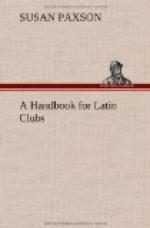Granted, that foreign systems of education may err by insisting on the arts of literary structure too much; think what we should lose by dwelling on them too little! The magic of mere words; the mission of language; the worth of form as well as of matter; the power to make a common thought immortal in a phrase, so that your fancy can no more detach the one from the other than it can separate the soul and body of a child; it was the veiled half revelation of these things that made that old text-book forever fragrant to me. There are in it the still visible traces of wild flowers which I used to press between the pages, on the way to school; but it was the pressed flowers of Latin poetry that were embalmed there first. These are blossoms that do not fade.
—Thomas Wentworth Higginson
SAINT AUGUSTINE’S LOVE OF LATIN
Andrew Lang, in his Adventures Among Books, writes:
“Saint Augustine, like Sir Walter Scott at the University of Edinburgh, was ‘The Greek Dunce.’ Both of these great men, to their sorrow and loss, absolutely and totally declined to learn Greek. ’But what the reason was why I hated the Greek language, while I was taught it, being a child, I do not yet understand.’ The Saint was far from being alone in that distaste, and he who writes loathed Greek like poison—till he came to Homer. Latin the Saint loved, except ’when reading, writing, and casting of accounts was taught in Latin, which I held not far less painful or penal than the very Greek. I wept for Dido’s death, who made herself away with the sword,’ he declares, ’and even so, the saying that two and two makes four was an ungrateful song in mine ears, whereas the wooden horse full of armed men, the burning of Troy, and the very Ghost of Creusa, was a most delightful spectacle of vanity.’”
THE WATCH OF THE OLD GODS
Were the old gods watching yet,
From their cloudy summits afar,
At evening under the evening star,
After the star is set,
Would they see in these thronging streets,
Where the life of the city beats
With endless rush and strain,
Men of a better mold,
Nobler in heart and brain,
Than the men of three thousand years ago,
In the pagan cities old,
O’er which the lichens and ivy grow?
Would they not see as they saw
In the younger days of the race,
The dark results of broken law,
In the bent form and brutal face
Of the slave of passions as old as earth,
And young as the infants of last night’s birth?
Alas! the old gods no longer keep
Their watch from the cloudy steep;
But, though all on Olympus lie dead
Yet the smoke of commerce still rolls
From the sacrifice of souls,
To the heaven that bends overhead.
OLD AND NEW ROME
Still, as we saunter down the crowded street,
On our own thoughts intent, and plans
and pleasures,
For miles and miles beneath our idle feet,
Rome buries from the day yet unknown treasures.




